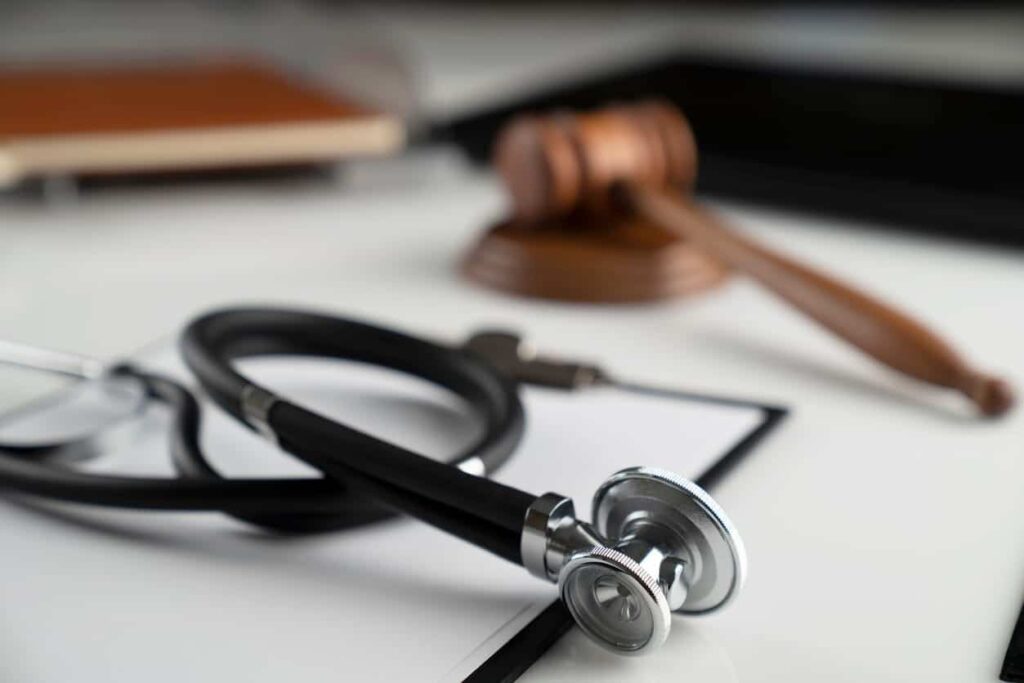People seek medical treatment to restore their health. It’s natural to feel a sense of betrayal from medical professionals who should help you but worsen your situation.

Doctors have limits, so it isn’t always their fault if they can’t cure what ails you; however, it’s devastating for patients when doctors exacerbate existing health issues or create new ones. You may wonder what constitutes medical malpractice and how to know if you have a legal claim. Let’s take a closer look at medical malpractice and why you might have grounds to file a medical malpractice lawsuit.
Are you the victim of medical malpractice? Contact Jack Bernstein, Injury Attorneys, now.
Florida’s medical malpractice laws
Florida’s medical malpractice laws focus on the process rather than the outcome of medical care. Whether a patient dies or suffers irreversible injuries doesn’t determine whether the medical professional is guilty of medical malpractice. The law considers whether the doctor took reasonable actions that other doctors would have taken under the same circumstances.
Florida’s laws protect medical professionals who act in their patient’s best interests and competently do their job. The laws also protect medical malpractice victims who receive substandard or inappropriate care. Victims must demonstrate that the medical professional is guilty of negligence to file a successful claim. Speaking to a medical malpractice attorney is the best way to determine if you have a legal claim.
Types of medical malpractice
Medical malpractice occurs when a medical professional doesn’t adhere to professional standards.
- Dismissing concerns: Suppose you go to your doctor with a medical concern. Your doctor ignores your symptoms, doesn’t order tests, and tells you you’re imaging your issues. Another doctor orders tests and delivers a diagnosis. You have grounds to sue the first doctor for medical malpractice because they didn’t treat your issues seriously and failed to take the basic steps required to determine a diagnosis.
- Inadequate aftercare: Patients should receive appropriate care after surgeries and other medical procedures. Failing to deliver appropriate aftercare is medical malpractice.
- Inadequate research: Doctors should seek comprehensive medical information about the patient and their family to ensure they have information that could affect their diagnosis and treatment. Failing to take a medical history can be grounds for a malpractice claim.
- Inaccurate results: Medical professionals should know how to read test results and ensure patients receive correct test result information. Medical malpractice occurs when a patient receives the wrong results because tests are misread or results are given to the wrong patient.
- Medical errors: Medication errors include prescribing incorrect medication, giving patients the wrong medication or the wrong dosage, or failing to follow the delivery instructions when giving medication. Medication errors are grounds for medical malpractice claims.
- Surgical errors: Sometimes, medical professionals perform unnecessary surgical procedures. Surgeons can also make mistakes during surgery. Victims of surgical errors can file a lawsuit.
Determining liability for medical malpractice
Sometimes, it’s clear who was guilty of medical malpractice. For example, doctors can be liable for misdiagnosing a patient. However, there are times when multiple parties may share liability. Suppose you received the wrong diagnosis because a medical receptionist put the wrong test results in your folder, and the doctor didn’t notice. The medical receptionist and doctor may share liability.
Medical malpractice attorneys investigate incidents to identify the parties responsible for your suffering and hold them accountable.
How to prove medical malpractice
Legal standards must be met to sue for medical malpractice successfully. First, the medical professional must be guilty of a breach of standard care. The law considers how most medical professionals in the same position would act under the same circumstances. When a medical professional doesn’t act that way, it can be grounds for medical malpractice.
Your legal team must also prove proximate causation by demonstrating that the breach of standard care caused a health issue, either by failing to diagnose or treat an existing issue or creating a new medical issue by engaging in inappropriate actions or failing to act.
Proving medical malpractice also involves demonstrating the medical professional caused significant harm. For example, a person who doesn’t receive treatment because they were misdiagnosed may die or have a limb amputated. A person who receives inappropriate treatment may receive medications they didn’t need that cause internal damage. Demonstrating significant harm establishes grounds for damages.
Damages you may be entitled to
You may seek economic and non-economic damages through a medical malpractice lawsuit. You may also have grounds to seek punitive damages based on the factors in your case.
Economic damages provide compensation for costs related to your medical issues, including:
- Childcare bills
- Lost income
- Medical bills
- Personal care costs
- Transportation bills
Non-economic damages acknowledge your suffering and provide compensation for various issues arising from your medical problems, such as the following:
- Diminished quality of life
- Grief
- Loss of intimacy
- Pain and suffering
Punitive damages apply to cases of gross negligence causing personal harm.
Contact Jack Bernstein, Injury Attorneys to discuss your medical malpractice claim today.
Medical malpractice FAQ
What is the statute of limitations for medical malpractice cases in Florida?
Florida’s statute of limitations for medical malpractice is 24 months. You must file a lawsuit within two years of the date the malpractice occurred to have your case heard.
What is my medical malpractice case worth?
Justifiable damages vary widely. A person who must pay for child care, someone to look after an elderly parent, and themselves may incur higher expenses than a person who only needs someone to care for them after suffering from medical malpractice. A person with a high salary may lose more income than a person with a modest salary. Your attorney can help ensure you consider everything you deserve compensation for when calculating damages.
How does medical malpractice differ from negligence?
Medical negligence can occur without causing a person harm. However, if the patient suffers because of medical negligence, it’s considered medical malpractice.
How do I find a medical malpractice attorney?
You can turn to local news coverage to learn which law firms handled high-profile medical malpractice cases in your area. You should also review websites and look for evidence the firm has won similar cases, or ask people you know to refer personal injury attorneys.
How much does a medical malpractice attorney cost?
Medical malpractice attorneys such as Jack Bernstein, Injury Attorneys, charge contingency fees. Consequently, you only pay legal fees once you receive compensation. A predetermined percentage of your settlement goes to your attorney to cover your legal fees.
Call Tampa’s top medical malpractice lawyers

It’s natural to be scared and stressed after discovering you may be the victim of medical malpractice. It’s also understandable that resolving your medical issues is your priority. That’s why turning to a medical malpractice attorney for legal help is the best way to ensure you protect your legal rights and seek appropriate compensation. Our legal team will gather evidence, file the legal paperwork, and handle settlement negotiations with the at-fault party to get you the justice you deserve.
Sources:
Is Administrative Staff Covered by Medical Malpractice Insurance? (2021).
Saltzman, J. et al. (2023). N. H. doctor allegedly misread mammograms and ultrasounds of two dozen women later diagnosed with breast cancer.
Map & Directions
Tampa Car Accident + Personal Injury Lawyers

For more than 40 years, personal injury lawyer Jack G. Bernstein has protected the rights of individuals who have been injured in a variety of circumstances. Throughout his career, Bernstein has been a strategist thoroughly dedicated to the idea of protecting the rights of his clients. Mr. Bernstein is a member of the Florida State Bar Association, the Hillsborough Bar Association and the Clearwater Bar Association.
Mr. Bernstein has the experience and expertise to handle a wide range of injury cases. Among the types of plaintiffs Mr. Bernstein represents are individuals involved in car accidents caused by drunk drivers or other exhibiting negligence, medical complications resulting from carelessness caused by a physician or a medical facility, including brain injury, bicycle, motorcycle, moped and truck accidents, admiralty law and cruise ship accidents, accidental drownings, all types of wrongful death lawsuits, along with most injury, catastrophic occurrences and legal malpractice issues.
Our firm handles every type of personal injury and accident case, using negotiation and litigation tactics effectively. We handle cases throughout Tampa, Sarasota, St. Petersburg, and Clearwater, FL. With a staff of approximately 40 people, including six lawyers and 34 support personnel, we have the legal resources to get the justice you deserve and the maximum recovery for your losses. Schedule your free consultation today; we are always here to help.
Free Case Evaluation
No Fees Unless We Win
No upfront fees, no risk, and no out of pocket cost to you or your family.
Entirely confidential – we respect your privacy, consultations are privileged.
